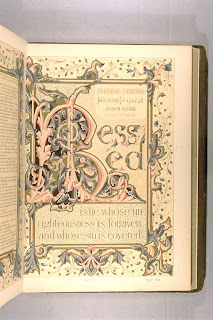
As a lifelong aficionado of old books, I have made a point of visiting the local antiquarian bookshops while travelling. During a visit to Prague in what was then still called Czechoslovakia in November 1976, I found more than one such shop and purchased a number of volumes dating from the 19th century. One of these was a metrical psalter and hymnal published in 1900, a scanned photograph of which can be found on my Genevan Psalter website.
Another volume dates from 1845 and contains the New Testament and Psalms translated into the Czech language. (Years later I was struck by the irony of my having taken a Bible out of a communist country!) The print is in the old German blackletter and the text uses an older spelling (with "w" for "v", "j" for "i", &c.). The frontispiece (shown above) indicates that this edition was intended for use by "Evangelical Christians of the Augsburg and Helvetic Confessions," i.e., by Lutheran and Reformed Christians.

The Psalms are, of course, of special interest to me, especially the various ways they are used in the course of the liturgy or by individual believers at prayer. Two days ago, while paging through this section, I discovered something I hadn't before noticed. The owner of this volume at the beginning of the 20th century, whose name seems to have been Karel (spelt "Carl" in the handwritten name at the bottom of the page opposite the frontispiece) Lány, read through the Psalms at the pace of one psalm per day (except for Psalm 119), taking time to mark the date at the top of each. (Might it have been this Karel Lány?) He started with Psalm 1 on "1./8.", i.e., 1 August 1914, and continued until he read Psalm 150 on "18./I. 1915", i.e., 18 January 1915.
The timing may not have been incidental. Lány lived in Austria-Hungary, whose heir to the throne, Archduke Franz Ferdinand, had been assassinated in Sarajevo on 28 June. Tensions had mounted after that, with Austria-Hungary issuing an ultimatum to Serbia on 23 July and declaring war five days later. This quickly brought the other European powers onside of either Austria or Serbia, with battles beginning and intensifying into the autumn and winter months. It seems rather likely that Lány — apparently a Lutheran or Reformed Christian living in the predominantly Catholic Czech provinces — turned to the Psalms as the Great War was breaking out.
Perhaps he had a son of conscription age and was concerned for his safety should his country go to war. As a member of a religious minority (and with Hungarian origins at that), he may have sensed how fragile his country's unity really was at the outset of what proved to be the defining event of the 20th century. One can only imagine the subsequent history of this little book. It is possible that Lány lived into the nazi and communist eras, when atheistic régimes made it costly to maintain a public witness to the faith. After Lány's death, the volume may have passed down to his children and grandchildren who were perhaps less appreciative of its significance, selling it to an antiquarian bookseller, whence it came into my hands three decades ago. Of course this can only be speculation.
One thing is certain. While the Battle of Tannenberg was raging to the north between Germany and Russia, Lány read these words from Psalm 27:
Though a host encamp against me,
my heart shall not fear;
though war arise against me,
yet I will be confident.
One thing have I asked of the LORD,
that will I seek after;
that I may dwell in the house of the LORD
all the days of my life,
to behold the beauty of the LORD,
and to inquire in his temple.
For he will hide me in his shelter
in the day of trouble;
he will conceal me under the cover of his tent,
he will set me high upon a rock.



